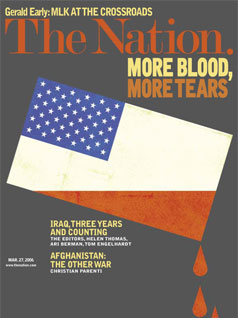‘Nation’ Notes
PHOTO NATION. With this issue, we begin a new series, Photo Nation. The first photo essay and accompanying text are by Eugene Richards, a photojournalist and filmmaker, is t...

Print Magazine
Cover art by: Cover art by Brian Stauffer, cover design by Gene Case & Stephen Kling/Avenging Angels
Purchase Current Issue or Login to Download the PDF of this Issue Download the PDF of this Issue
PHOTO NATION. With this issue, we begin a new series, Photo Nation. The first photo essay and accompanying text are by Eugene Richards, a photojournalist and filmmaker, is t...
LIBERALS, LIBERALS EVERYWHERE
Washington, DC
In his March 6 "Liberal Media" column, titled " Eric Alterman and Our Readers and Max Blumenthal

In the first installment of a new series called Photo Nation, a young soldier from Missouri recounts the ambush of his unit in Iraq.